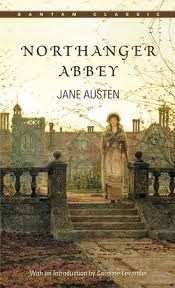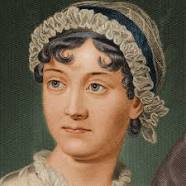Northanger Abbey Page #3
Northanger Abbey was the first of Jane Austen's novels to be completed for publication, in 1803. However, it was not published until after her death in 1817, along with another novel of hers, Persuasion.
They were not long able, however, to enjoy the repose of the eminence they had so laboriously gained. Everybody was shortly in motion for tea, and they must squeeze out like the rest. Catherine began to feel something of disappointment--she was tired of being continually pressed against by people, the generality of whose faces possessed nothing to interest, and with all of whom she was so wholly unacquainted that she could not relieve the irksomeness of imprisonment by the exchange of a syllable with any of her fellow captives; and when at last arrived in the tea-room, she felt yet more the awkwardness of having no party to join, no acquaintance to claim, no gentleman to assist them. They saw nothing of Mr. Allen; and after looking about them in vain for a more eligible situation, were obliged to sit down at the end of a table, at which a large party were already placed, without having anything to do there, or anybody to speak to, except each other. Mrs. Allen congratulated herself, as soon as they were seated, on having preserved her gown from injury. “It would have been very shocking to have it torn,” said she, “would not it? It is such a delicate muslin. For my part I have not seen anything I like so well in the whole room, I assure you.” “How uncomfortable it is,” whispered Catherine, “not to have a single acquaintance here!” “Yes, my dear,” replied Mrs. Allen, with perfect serenity, “it is very uncomfortable indeed.” “What shall we do? The gentlemen and ladies at this table look as if they wondered why we came here--we seem forcing ourselves into their party.” “Aye, so we do. That is very disagreeable. I wish we had a large acquaintance here.” “I wish we had any--it would be somebody to go to.” “Very true, my dear; and if we knew anybody we would join them directly. The Skinners were here last year--I wish they were here now.” “Had not we better go away as it is? Here are no tea-things for us, you see.” “No more there are, indeed. How very provoking! But I think we had better sit still, for one gets so tumbled in such a crowd! How is my head, my dear? Somebody gave me a push that has hurt it, I am afraid.” “No, indeed, it looks very nice. But, dear Mrs. Allen, are you sure there is nobody you know in all this multitude of people? I think you must know somebody.” “I don't, upon my word--I wish I did. I wish I had a large acquaintance here with all my heart, and then I should get you a partner. I should be so glad to have you dance. There goes a strange-looking woman! What an odd gown she has got on! How old-fashioned it is! Look at the back.” After some time they received an offer of tea from one of their neighbours; it was thankfully accepted, and this introduced a light conversation with the gentleman who offered it, which was the only time that anybody spoke to them during the evening, till they were discovered and joined by Mr. Allen when the dance was over. “Well, Miss Morland,” said he, directly, “I hope you have had an agreeable ball.” “Very agreeable indeed,” she replied, vainly endeavouring to hide a great yawn. “I wish she had been able to dance,” said his wife; “I wish we could have got a partner for her. I have been saying how glad I should be if the Skinners were here this winter instead of last; or if the Parrys had come, as they talked of once, she might have danced with George Parry. I am so sorry she has not had a partner!” “We shall do better another evening I hope,” was Mr. Allen's consolation. The company began to disperse when the dancing was over--enough to leave space for the remainder to walk about in some comfort; and now was the time for a heroine, who had not yet played a very distinguished part in the events of the evening, to be noticed and admired. Every five minutes, by removing some of the crowd, gave greater openings for her charms. She was now seen by many young men who had not been near her before. Not one, however, started with rapturous wonder on beholding her, no whisper of eager inquiry ran round the room, nor was she once called a divinity by anybody. Yet Catherine was in very good looks, and had the company only seen her three years before, they would now have thought her exceedingly handsome. She was looked at, however, and with some admiration; for, in her own hearing, two gentlemen pronounced her to be a pretty girl. Such words had their due effect; she immediately thought the evening pleasanter than she had found it before--her humble vanity was contented--she felt more obliged to the two young men for this simple praise than a true-quality heroine would have been for fifteen sonnets in celebration of her charms, and went to her chair in good humour with everybody, and perfectly satisfied with her share of public attention. CHAPTER 3 Every morning now brought its regular duties--shops were to be visited; some new part of the town to be looked at; and the pump-room to be attended, where they paraded up and down for an hour, looking at everybody and speaking to no one. The wish of a numerous acquaintance in Bath was still uppermost with Mrs. Allen, and she repeated it after every fresh proof, which every morning brought, of her knowing nobody at all. They made their appearance in the Lower Rooms; and here fortune was more favourable to our heroine. The master of the ceremonies introduced to her a very gentlemanlike young man as a partner; his name was Tilney. He seemed to be about four or five and twenty, was rather tall, had a pleasing countenance, a very intelligent and lively eye, and, if not quite handsome, was very near it. His address was good, and Catherine felt herself in high luck. There was little leisure for speaking while they danced; but when they were seated at tea, she found him as agreeable as she had already given him credit for being. He talked with fluency and spirit--and there was an archness and pleasantry in his manner which interested, though it was hardly understood by her. After chatting some time on such matters as naturally arose from the objects around them, he suddenly addressed her with--“I have hitherto been very remiss, madam, in the proper attentions of a partner here; I have not yet asked you how long you have been in Bath; whether you were ever here before; whether you have been at the Upper Rooms, the theatre, and the concert; and how you like the place altogether. I have been very negligent--but are you now at leisure to satisfy me in these particulars? If you are I will begin directly.”
Translation
Translate and read this book in other languages:
Select another language:
- - Select -
- 简体中文 (Chinese - Simplified)
- 繁體中文 (Chinese - Traditional)
- Español (Spanish)
- Esperanto (Esperanto)
- 日本語 (Japanese)
- Português (Portuguese)
- Deutsch (German)
- العربية (Arabic)
- Français (French)
- Русский (Russian)
- ಕನ್ನಡ (Kannada)
- 한국어 (Korean)
- עברית (Hebrew)
- Gaeilge (Irish)
- Українська (Ukrainian)
- اردو (Urdu)
- Magyar (Hungarian)
- मानक हिन्दी (Hindi)
- Indonesia (Indonesian)
- Italiano (Italian)
- தமிழ் (Tamil)
- Türkçe (Turkish)
- తెలుగు (Telugu)
- ภาษาไทย (Thai)
- Tiếng Việt (Vietnamese)
- Čeština (Czech)
- Polski (Polish)
- Bahasa Indonesia (Indonesian)
- Românește (Romanian)
- Nederlands (Dutch)
- Ελληνικά (Greek)
- Latinum (Latin)
- Svenska (Swedish)
- Dansk (Danish)
- Suomi (Finnish)
- فارسی (Persian)
- ייִדיש (Yiddish)
- հայերեն (Armenian)
- Norsk (Norwegian)
- English (English)
Citation
Use the citation below to add this book to your bibliography:
Style:MLAChicagoAPA
"Northanger Abbey Books." Literature.com. STANDS4 LLC, 2025. Web. 22 Feb. 2025. <https://www.literature.com/book/northanger_abbey_45>.








Discuss this Northanger Abbey book with the community:
Report Comment
We're doing our best to make sure our content is useful, accurate and safe.
If by any chance you spot an inappropriate comment while navigating through our website please use this form to let us know, and we'll take care of it shortly.
Attachment
You need to be logged in to favorite.
Log In